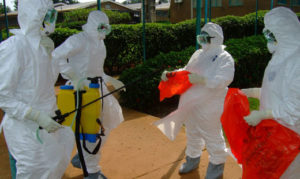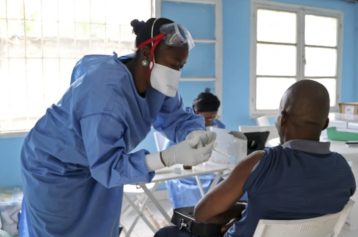
The World Health Organization confirmed that 603 people have died since the disease emerged in February, primarily affecting the nations of Sierra Leone, Liberia and Guinea.
“It’s very difficult for us to get into communities where there is hostility to outsiders,” WHO spokesman Dan Epstein said at news briefing in Geneva, according to Reuters. “We still face rumors, and suspicion and hostility…People are isolated, they’re afraid, they’re scared.”
While it is believed that the outbreak started in the remote southeastern area of Guinea, it has spread across the region’s porous borders and for the first time hit the capital cities, accelerating the fear of a deep and widespread outbreak.
Health officials report that in Sierra Leone and Guinea, patients are being hidden by relatives and friends who believe hospitalization is a “death sentence.” In Liberia, health workers have actually been chased away by armed gangs.
NPR reports that in some areas of Sierra Leone, villagers have stopped having sex or even touching each other, no longer shaking hands at church or when they meet friends.
Over the last week, Sierra Leone recorded 52 deaths, while Liberia reported 13 and three were recorded in Guinea, according to the WHO.
WHO Director-General Margaret Chan confirmed that the outbreak was the worst the world has ever seen by number of cases, adding, “The situation is serious but not out of control yet.”
“Sometimes the challenge for us is countries like to do disease control their way. But I think this is one such situation where countries must come together and adopt a similar approach to deal with a very dangerous disease,” Chan said.
She said the WHO was consulting with anthropologists to help suspend local customs such as eating bush meat or hugging and kissing Ebola victims at their funerals, which can transmit the disease.
In the three countries, health officials are focusing on people who have been exposed to others with Ebola, and monitoring them for the 21-day incubation period to see if they were infected.
“It’s probably going to be several months before we are able to get a grip on this epidemic,” Epstein said.
Last week, fear of a massive outbreak brought together the ministers in an emergency two-day meeting in Accra, Ghana, called by the WHO, where they reportedly committed to better surveillance to detect cases of the virus, enhanced cross-border collaboration, better engagement with local communities, and closer cooperation with the United Nations, WHO and other partners.
The ministers also recommended setting up a sub-regional control center in Guinea to coordinate technical support.
Dr. Peter Piot, the scientist who first discovered the Ebola virus in the 1970s, told CNN that the current situation is “unprecedented.”
“One, [this is] the first time in West Africa that we have such an outbreak,” he said. “Secondly, it is the first time that three countries are involved. And thirdly, it’s the first time that we have outbreaks in capitals, in capital cities.”
The health ministers from these countries attended the meeting: the Democratic Republic of the Congo, Gambia, Ghana, Guinea, Guinea-Bissau, Ivory Coast, Liberia, Mali, Senegal, Sierra Leone and Uganda—as well as health experts, Ebola survivors, WHO representatives, and representatives of airlines and mining companies, in addition to donor nations helping to fund efforts to combat the virus.
One of the most feared diseases in the world, Ebola starts with symptoms that mimic the flu, such as headache, fever, fatigue. Next is the horrifying spectacle that first riveted the world’s attention when it appeared more than 30 years ago: diarrhea and vomiting, while the virus shuts off the blood’s ability to clot, causing patients to suffer internal and external hemorrhaging, with blood pouring from their orifices. Many die in an average of 10 days.
The virus can spread easily because people can travel without realizing they’re carrying it; Ebola can take between two and 21 days after exposure to sicken the host. The good news is a patient isn’t contagious — meaning they can’t spread the virus to other people — until they are already showing symptoms. At that point, the disease is transmitted by direct contact with the blood and body fluids of infected animals or people.
While it is believed that there is no vaccine or cure, NPR reported that doctors were exhilarated when six people, who were confirmed with the virus, were able to walk out of the treatment center in Sierra Leone after they were completely cured.
Fruit bats are considered to be the natural host of the virus.


